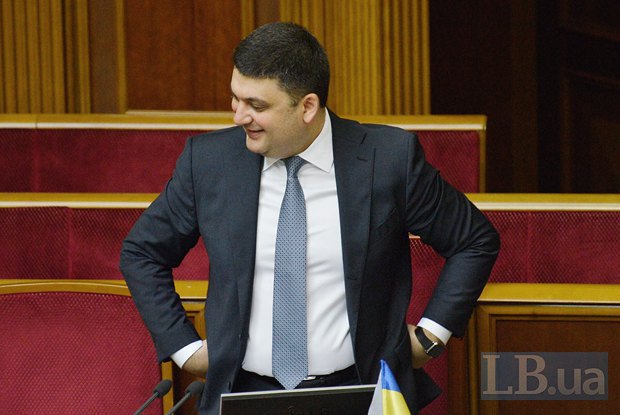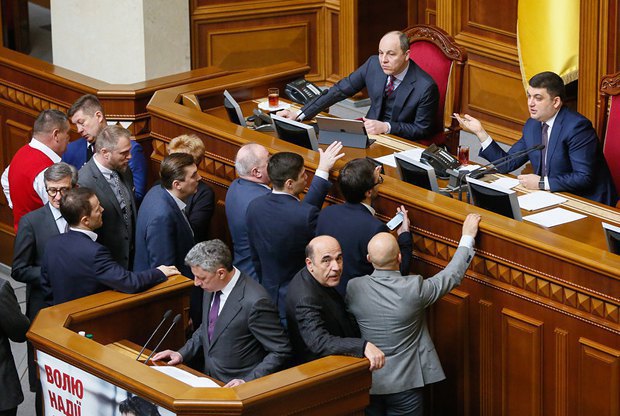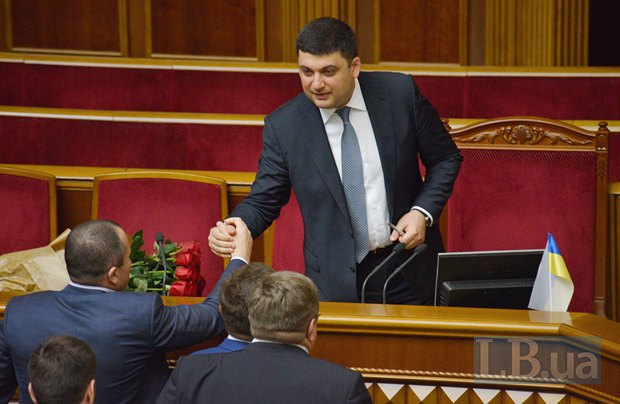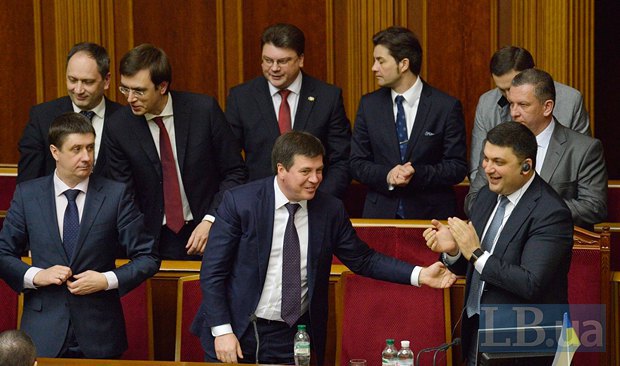"Its" means the one who is equally controllable and giving Bankova [street, where the Ukrainian president's office is located] all existing levers of power (uniformed agencies including). Hroysman was a perfect candidate. For some reason, Poroshenko thought (and still thinks) that Volodymyr Borysovych owes him his exposure to big politics and therefore should be obedient and thankful. Be an avatar.
However, the history went its own way: the People's Front took the electoral lead and Yatsenyuk remained the prime minister. Hroysman certainly got upset then. It was a moral redress for him to become parliament speaker. And now status quo is restored.

The last one to leave even stole the bench
Bankova has been overtaken by neurosis (medically speaking) and has been seeking to replace Yatsenyuk ever since last autumn. Over this time, potential replacements for Arseniy Petrovych included [National Security and Defence Council Secretary Oleksandr] Turchynov, [Petro Poroshenko Bloc faction leader Yuriy] Lutsenko, [deputy presidential administration head Dmytro] Shymkiv, [ex-Finance Minister Natalie] Jaresko, [Foreign Minister Pavlo] Klimkin, [new First Deputy Prime Minister Stepan] Kubiv, [Odesa governor Mikheil] Saakashvili and a number of other – more exotic – characters. However Hroysman always remained the most real one. He was real because Poroshenko's bench is very short. To be more accurate, it does not exist. As one wise person said: the last one to leave even stole the bench.
Second, the presidential administration, by its old habit, considered Hroysman an "avatar". Without even taking into account that Volodymyr Borysovych of the autumn 2014 and the spring 2016 was not the same person. His chairmanship of the parliament presidium did not go unnoticed for him either: he honed his skills in political intrigues, the art of collusion, he managed to grab the attention of a certain number of various factions (he has been especially active in such talks in the recent three weeks when he was plucking MPs out by one, explaining them that he was casting his own team). Formally, speaker Hroysman was among equals whereas he wanted to be the first among equals. He wanted to sit at the table not on an extra stool but in a chair. The chair had to be similar to that taken by [Poroshenko's close ally Ihor] Kononenko. And he wanted to be pleased not with what he was given (Ukrainian Postal Service, the former State Geodesy and Cadastre Service, and the Kiev customs service), but with what he chooses himself; and to also be able to "carve" something for the others.
And what is most important: he was no longer an avatar. And Bankova simply did not notice this. And it was very surprised when he "showed what he is worth" (unless it is a play, which is not ruled out either). The People's Front was even more surprised as they thought that they would have to "divide" portfolios and flow "between the two". It turned out – "among the three". Meanwhile, Hroysman (and Kosyuk, who was hanging around totally forgotten for some reason) acted as a separate party with its own requests and appetite. Neither the Petro Poroshenko Bloc, nor the People's Front was happy about it. Scandals broke out. Bankova repeatedly threatened the obstinate speaker with depriving him of the prospect of premiership but he firmly stood his ground. Hroysman knows: publicity is the best tool to fight backstage deals. Certainly, in doses, very carefully measured doses – the way he deems beneficial. With the help of this tool, Volodymyr Borysovych ensured that:
- his personnel requests are satisfied. From [UDAR deputy head Vitaliy] Kovalchuk, who was "taken down", to manning the Cabinet of Ministers with the whole army of his Vinnytsya friends;
- discredit of Bankova. In the course of negotiations on the prime minister's post, the presidential administration demonstrated unenviable institutional impotence and inability to settle even the most basic issue with parliament. Not to mention that it was extremely prone to emotions;
- support of "the powerful of this world". Something tells me: oligarchs who strongly supported the future prime minister will be "inherited" by his successor. Because what they care about is a chair not a person in it. Just business.

Well, it is not really so. Everything is more complicated.
It is clear that after this the old trust between Petro Oleksiyovych and Volodymyr Borysovych is no longer. So much for the format of "senior-younger partner". By making a bid for his own political game, Hroysman exposed himself as a potential election competitor to Poroshenko. Our president does not forgive this. He has a good memory. Even too good. The conflict (to be exact, the fight for power) between them will only deepen with time. Considering that Ukraine is a parliamentary-presidential republic, the prime minister has a tactical advantage. But Bankova can win a long-term fight.
That is because Hroysman made a serious mistake at the start. Without having a rocket to attack the enemy with, he exposed its launch site. Instead of quietly strafing the enemy. This is first.
Second, an ardent fight for portfolios or flows does not guarantee an equally ardent fight for the country. Personal happiness hardly ever matches the state one.
Decentralization as a lucky ticket
Now let's talk about challenges and threats Prime Minister Hroysman is facing and his opportunities.
Challenges:
- [He has to] ensure the functioning of the parliamentary-presidential republic. Not a fake but a true one. Bankova only remembers that our parliament is a decision-making centre when it needs to shift responsibility off its shoulders to someone else. It is in Hroysman's interest to make sure that MPs look up to him rather than to the presidential administration. The prime minister has all the necessary resources, the rest is paperwork;
- bridge the crisis of trust between the authorities and citizens. For as long as the authorities are on their own and citizens on their own, there is no reason to speak about any success in reforms.

Threats:
- Having one's own team is important for every leader. No doubt about it. However I would like to know: is the whole deputy mayor of Vinnytsya (the city is big but residents are fewer than 1 million) capable of managing the entire country's social policy? And he will have to do this amid the war and the flaring crisis. Andriy Reva will have to give the answer but I think it is already clear;
- work with parliament. An easy question: what competitive advantage did candidate for prime minister Hroysman had over candidate for prime minister Jaresko? Right, his ability to work with parliament. Whereas in case of an important vote, Natalie Ann would have to ask Bankova for parliament support, it was expected that Volodymyr Borysovych would be capable of settling the issue on his own without "nickel-and-diming the God". However the ex-speaker failed his very first exam. The government programme, which makes the Cabinet of Ministers immune for a year, was approved only at the third try. And with moans and groans. There is nothing surprising about it: out of 257 votes for Hroysman as prime minister, the decisive role was played by representatives of the groups and "hired guns" (among them are Ihor Kolomoyskyy's people). Any agreements with them are one-off, as it is known. Then it is a matter of bargaining;
- responsibility. While parliament is the area of collective irresponsibility, the executive is a quite specific target of public discontent. This means that 70 per cent of Yatsenyuk's anti-rating had to do not with him as a person but with his former seat. Yatsenyuk has left but his chair has not. Now it has Hroysman in it. The farther he is from Bankova, the more responsibility lies personally with him and the higher his reputational risks are;
- Mikheil Saakashvili. Back on Monday [11 April] the head of the Odesa regional state administration called on MPs – with regard to the offered terms – not to support the new Cabinet of Ministers, calling it "anti-popular, corrupt and oligarchic". By the book, a mad dog has to bite someone. And if Yatsenyuk left the scene, now it is Hroysman's turn. By the way, Saakashvili did not say a word about the president's offshore scandal. Not a word. It is symptomatic.

Opportunities:
- Hroysman insisted on quite particular portfolios for his people for a reason. [He wanted] Volodymyr Kistion to become deputy prime minister, Andriy Reva social policy minister and Oleksandr Sayenko minister of the Cabinet of Ministers. This is the required minimum which will allow him to "take off". To give a visible result in a short term. As a smart man, Volodymyr Borysovych understands that he will not be able to move the mountains in health care (where a kamikaze manager is yet to be found) or education. It is a different story with the Social Policy Ministry. Here one can always increase a living wage, continue with the practice of paying portions of defaulted Soviet deposits and so on. Internally displaced persons are also a colossal resource of voters. According to official reports, there are 1.8 million of them, whereas in practice there are many more. These people have no "assembly point" and the first politician to recognize this and use this chance will earn additional election points. Volodymyr Hroysman, it seems, has already understood this. Now he has to try and put his idea to life;
- Hroysman has serious political ambitions, as we already know. But to move on, he needs a platform. In a global sense, the issue of decentralization can be used as such a platform. Hroysman has a track record in local self-government, he is close to and comprehensible for thousands of his former colleagues all over the country. Regional leaders also live from election to election. They also need to "home in" – looking for support – on someone in the central authorities. From this point of view, Volodymyr Borysovych is getting an additional lever. You should remember that in accordance with the Ukrainian legislation, governors have dual subordination: to the Cabinet of Ministers and the president. Yatsenyuk's Cabinet of Ministers did not pay much attention to governors at all. Bankova was only sporadically interested, usually on the eve of elections. Hroysman now has a perfect chance to fill the gap. However, here he is doomed to clash with Vitaliy Kovalchuk, who oversees regional policy in the presidential administration. And here diamond cuts diamond. The conflict between Hroysman and Kovalchuk promises to be no less interesting than that between Hroysman and Poroshenko. You may know that Kovalchuk is also ambitious and unlikely to forget the public shame of "being knocked down" from the Cabinet of Ministers thanks to Hroysman. Besides, Vitaliy's pet project – the technocratic Our Land (Nash Kray) party consisting of regional ex-officials – is seen as a success on Bankova. To such an extent that after Our Land's local representatives filled hundreds of councils all over the country, the presidential administration decided to develop the project with a view to a parliamentary election. And it does not matter whether it is planned or snap.
If Hroysman and Kovalchuk found common turf, the former could use Our Land as the basis for its own party activity. And "instil" in it his local project, the Vinnytsya European Strategy party working in the Vinnytsya city council. However, these are just the details, it is not difficult at all to "reset" any party from the scratch, having bought a required package of documents.
Instead of conclusion
Sic transit gloria mundi. Thus passes the glory of the world. A newly-elected pope pronounces this phrase when he first puts on the symbol of his power, the Ring of the Fisherman. He says it in order not to forget who put him at the apostolic see and that he is not eternal, his power is frail and the glory of the world passes.
The prime minister of Ukraine should also remember this. Especially in the light of the two main challenges of this year: privatization and the problem of the land market.








